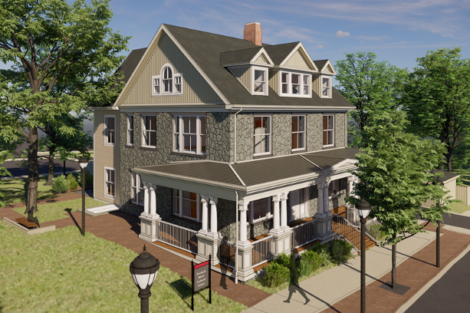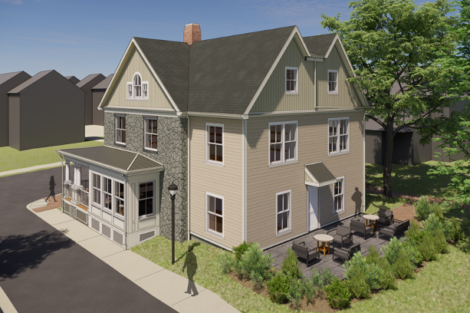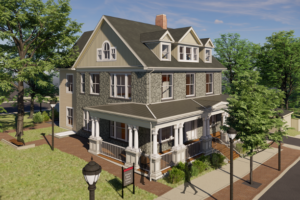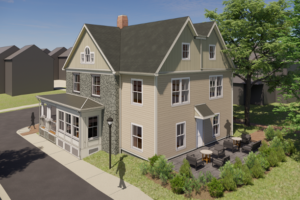Creating a new Portlock Black Cultural Center
In a planning process that began in 2017, the College has been working with students and alumni to develop a program for a new Portlock Black Cultural Center. Plans for the new center are concurrent with the projected second phase of the College’s McCartney housing project, which requires removal of the existing building. Lafayette plans to move the house at 517 Clinton Terrace to 41 McCartney St., at the corner of McCartney and Hart streets, to serve as a new Portlock Center. The new Portlock Center will be in place before the existing building and the others in its square block are taken down to make room for student housing.
“The new center will become part of a visible gateway to the College, and the new house will be able to accommodate more programming than the current location,” says Robert Young ’14, director of Intercultural Development. “Students and alumni identified several limitations with the existing building, including accessibility issues, inadequate boundaries between public and private spaces, and little opportunity for simultaneous functions and outdoor activities. We look forward to future engagements with students around the planning of the house.”
Based on student and alumni input, the new center will continue the Portlock tradition of providing a safe and comfortable home away from home for Black students. The new building includes a wrap-around porch and rear terrace to provide additional social and program space. The center will host structured and impromptu discussions, including those involving invited speakers, and social gatherings. Building on the history of Black student community and activism embodied in the original Portlock Center, the new center also will include artwork and displays celebrating that history.
The center first opened as the Malcolm X Liberation Center in 1970 on part of the site that is now occupied by Farinon College Center. The center was relocated to its current location, 101 McCartney St., in 1990, and in 1999 it was renamed for David A. Portlock, Lafayette’s assistant dean of academics who died three years earlier at age 55. Portlock—who first joined the College in 1968 as a part-time consultant to the dean of students before becoming assistant dean of students in 1970 and assistant dean of academics in 1975— played a pivotal role in leading Lafayette toward a more diverse and inclusive future. He helped create several programs at Lafayette, including the Black Cultural Center and the campus’ Association of Black Collegians. He also coordinated the study abroad program and was an adviser to student government.
Creation of the Malcolm X Liberation Center came in response to student demands delivered through a “Black Manifesto” for “a place for black students to socialize, fraternize, and experience community … [and] as a meeting place for both blacks and whites who wish to partake in meaningful dialogue of common concerns and issues.”
Several intercultural student groups— Association of Black Collegians, Hispanic Society of Lafayette, International Students Association, Nia (which means “purpose” in Swahili), and the Lafayette African and Caribbean Students’ Association—now use the center.
“We learned during our conversations and surveys that students and alumni want to offer programming and activities that cannot be accommodated by the current building,” says Adrienne McKinney of ALMA architecture, lead designer for the project. “The current structure has limited space and accessibility issues.
“The new center will be on a site that provides prominent visibility at a campus gateway, and it will provide students and alumni with larger public and private spaces, better connections to outdoor space, and the ability to showcase the history of the center through displays and preserved building elements,” she adds.
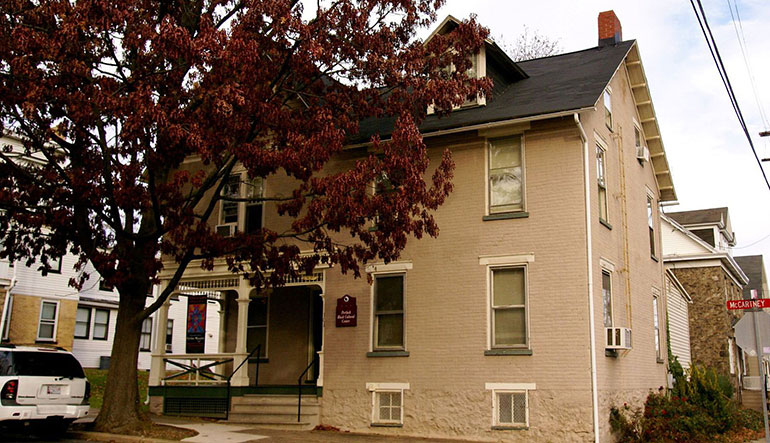
Existing Portlock Black Cultural Center – 101 McCartney Street
